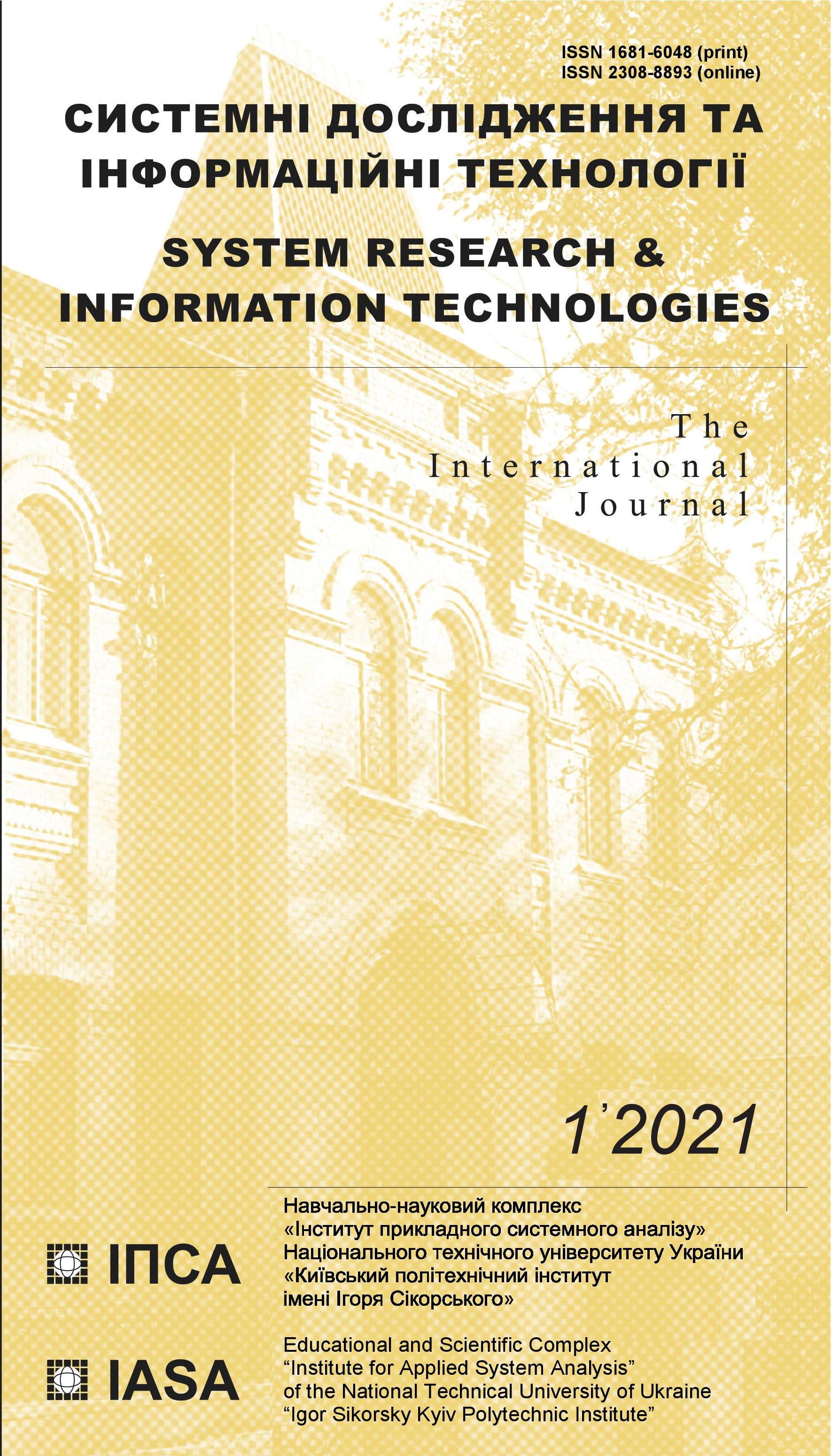Scenario cognitive modeling of development trends of the complexity system “youth, labor market, quality of life”
DOI:
https://doi.org/10.20535/SRIT.2308-8893.2021.1.09Keywords:
youth, labor market, simulation, cognitive map, scenario, opportunity, situationAbstract
Conducting research on the quality of life of young people and the impact on it of such a significant factor as the youth labor market, as well as related research on the problems of state support for young people, require the use of simulation methods due to the incompleteness of information and poorly structured problems of such complex systems as the quality of life of young people and the labor market. The article gives a brief overview of the categories “labor market”, “quality of life”, “youth”, which is necessary to determine the content of cognitive modeling of the complex system “youth, labor market, quality of life”. The technology of cognitive modeling is briefly presented. The results of the application of cognitive simulation modeling to the study of the quality of life of young people in relation to the labor market are presented. An example of modeling is presented in the form of a corresponding cognitive map and a number of scenarios for the possible development of situations on it, which may arise under the assumed influence of various social and economic factors, as well as under the influence of regulatory and control systems.
References
S.A. Ayvazyan, Cross-country analysis of integral categories of the population's quality of life (econometric approach). Moscow: TsEMI RAN, 2001, 61 p.
R. Axelrod, The Structure of Decision: Cognitive Maps of Political Elites. Princeton, University Press, 1976.
N.A. Abramova and Z.K. Avdeeva, “Cognitive analysis and management of the development of situations: problems of methodology, theory and practice”, Problems of management, no. 3, pp. 85–87, 2008.
I.V. Bestuzhev-Lada, G.S. Batygin, and N.P. Grishaeva, “The category “quality of life” in modern Western sociology”, Modern concepts of the level, quality and way of life. Moscow, 1978, pp. 142–158.
J. Casti, Connectivity, Complexity, and Catastrophe in Large-scale Systems. A Wiley–Interscience Publication International Institute for Applied Systems Analysis. Chichester–New York–Brisbane–Toronto: JOHN WILEY and SONS, 1979.
G.V. Gorelova and A.A. Sahak, “Youth employment, quality of life, cognitive modeling”, Reports of the XIII All-Russian Meeting on Governance Problems, VSPU-2019, Moscow, June 17–20, 2019.
G.V. Gorelova, O.V. Kaurova, A.A. Saak, and V.A. Vishnyakova, “A cognitive approach to the study of youth employment in the labor market”, Social policy and sociology, vol. 16, no. 1 (120), pp. 18–27, 2017.
G.V. Gorelova, “Labor market of the South of Russia, cognitive analysis of development”, Sat. articles “System analysis and information technology”: materials of the 14th International Scientific and Technical Conference SAIT 2012. Kiev: UNK “IASA” NTUU “KPI”, 2012, pp. 44–46.
A.N. Deynega, O.V. Koltsova, and T.N. Kharlamov, The quality of labor life as a criterion for assessing the maturity of social and labor relations: monograph. Publishing house of IP Chesnokov, 2012, 140 p.
M. Erdem, “The Level of Quality of Work Life to Predict Work Alienation”, Educational Sciences: Theory & Practice, vol. 14, no. 2, pp. 534–544, 2014.
C. Eden, “Cognitive mapping”, European Journal of Operational Research, no. 36, pp. 1–13, 1998.
Yu.A. Zubok, T.K. Rostovskaya, and N.L. Smakotina, Youth and youth policy in modern Russian society. Moscow: ITD “PERSPECTIVE”, 2016, 166 p.
V.V. Zagrebin, “Approaches to the definition of the category of “youth”, Concept, no. 02 (February), 2014. Available: http://e-kon-cept.ru/2014/14030.htm.
Innovative development of socio-economic systems based on foresight and cognitive modeling methodologies. Collective monograph; ed. G.V. Gorelova, N.D. Pankratova. Kiev: Naukova Dumka, 2015, 464 p.
I.M. Ilyinsky and V.A. Lukov, “State youth policy in Russia: philosophy of continuity and generational change”, Knowledge. Understanding. Skill, no. 4, pp. 5–14, 2008.
S.V. Kovriga and V.I. Maksimov, “Cognitive technology of strategic management of the development of complex socio-economic objects in an unstable external environment”, Sb. 1st works “Cognitive analysis and situation management” (CASC’2001), Tr. Int. Conf., t.1, 2001.
T. Heiskanen and E. Jokinen, “Stability and Change of the Quality of Working Life in Restructuring Municipalities”, Social Indicators Research, vol. 118, no. 2, pp. 579–599, 2014.
V.V. Kulba, D.A. Kononov, S.S. Kovalevsky, S.A. Kosyachenko, R.M. Nizhegorodtsev, and I.V. Chernov, Scenario analysis of the dynamics of the behavior of socio-economic systems (Scientific edition). Moscow: IPU RAN, 2002, 122 p.
V. Kul’ba, D. Kononov, I. Chernov, and P. Ponomarev, “Group Management in Social and Economic Systems: Research of Efficiency by Means of Cognitive Analysis”, 18th IFAC Conference on Technology, Culture and International Stability (TECIS 2018), IFAC Papers OnLine 51-30/2018, pp. 510–515.
A. Monkevicius, “Quality of Working Life Concept and Empirical Indicators”, Intelektine Ekonomika, vol. 8, no. 1(19), pp. 8–24, 2014.
A. Raikov, “Cognitive Modeling Quality Rising by Applying Quantum and Optical Semantic Approaches”, 18th IFAC Conference on Technology, Culture and International Stability.
F. Roberts, Graph Theory and its Applications to Problems of Society. Philadelphia: Society for Industrial and Applied Mathematics, 1978.
Program for cognitive modeling and analysis of socio-economic systems at the regional level. Certificate of state registration of computer programs No. 2018661506 dated 09/07/2018.
A.A. Saak, “Research of the relationship between the quality of life of young people and the socio-economic environment”, Problems of economics and legal practice, no. 1, pp. 57–60, 2018.
A.S. Todorov, Quality of Life: A Critical Analysis of Bourgeois Concepts. Moscow: Progress, 1995, 164 p.
N. Flores, C. Jenaro, M.B. Orgaz, and M.V. Martin, “Understanding Quality of Working Life of Workers with Intellectual Disabilities”, Journal of Applied Research in Intellectual Disabilities, vol. 24, no. 2, pp. 133–141, 2011.
I.A. Filyukov, “Genesis of scientific ideas about the quality of life of the population: domestic and foreign approaches”, News of higher educational institutions. Volga region. Social Sciences, no. 3 (11), pp. 50–59, 2009.
I.V. Tsygankova, “The Genesis of the formation of the concept of the quality of working life”, Bulletin of the Novosibirsk State University, no. 3 (7), pp. 183–190, 2007.

